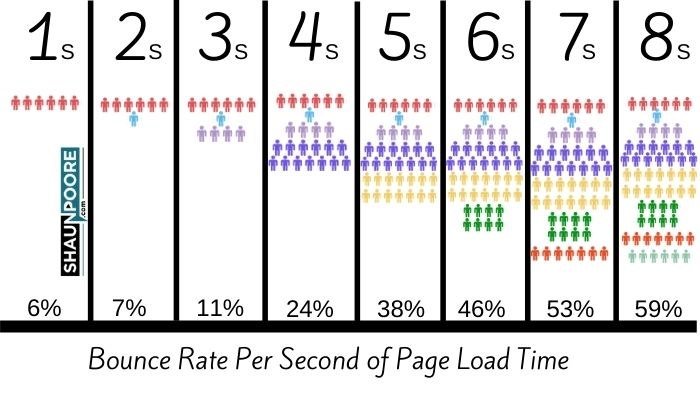I started blogging about digital business on this blog in 2019. Unfortunately, I was not the first person to discover the niche; there was some serious competition.
I eventually got serious traffic. So how did I do it? Here are 7 tips I’d give to past-me about breaking into a competitive blogging niche.
1) Bring Your “A” Game
There are only 10 spaces available on page 1 of Google.
By choosing a popular topic in an industry where you get to work from home in your pajamas all day long, you’ve entered one of the most cutthroat industries in existence. You’re going to need to write great content to compete.
In the early aughts, you could write a 500 word post with no images and rank. Times have changed. I’m not a big believer in the word-count arms race that other “experts” focus on. But, you’re going to need well-written 1,000+ word articles loaded with multimedia to beat good posts that already rank #1.

I want to assure you that your small blog can beat the big players given enough time. I started with nothing and have since ranked top 5 for building a green screen and setting up Gmail with a custom domain. If you Google these subjects there are hundreds of good posts. Mine are just a little bit better.
2) Quantity Matters Too – Write More Posts
This is why blogging is so hard. Not only do you need good posts, but you need a lot of them. My blog’s quality is excellent, but the site really didn’t take off until I wrote over 100+ posts. Had I only been publishing once a month, I’d have never gotten to where I am today.
Create a writing schedule you can stick to. If you’re working a full-time job and can only muster one post per week, you’ll reach 100 posts in 2 years. That’s not bad. But, if you can get up to two posts a week, you’ll reach 100+ by the end of the year. Just find a schedule and be as consistent with it as you can.
| Post Frequency | Time to 100 Posts | Time to 400 Posts |
|---|---|---|
| Once a Month | 8 years | 32 years |
| Bi-Weekly | 4 years | 16 years |
| Once a Week | 2 years | 8 years |
| Twice a week | 1 year | 4 years |
| Three Times a Week | 33 weeks | 2.5 years |
You can also try to speed this process up by hiring writers. But that opens another can of worms as you now have to manage people and keep the content quality up.
3) Dominate Core Web Vitals (Improve Website Speed)
I feel annoyed when SEO’s tell me page speed will help me rank higher in Google. I’d Google competitive keywords and discover the top websites had abysmal page-speed scores. Relevance and domain authority were clearly much bigger ranking factors.
| Query w/Link to #1 Result | Mobile Largest Contentful Paint (LCP) | Mobile First Input Delay (FID) | Mobile Cumulative Layout Shift (CLS) |
|---|---|---|---|
| How To Start a Business | 6.2 s | 45 ms | 0.93 |
| How To Lose Weight | 3.5 s | 9,300 ms | 0.277 |
| How to Start a Blog | 3.5 s | 190 ms | 0 |
| Why a business partner is a bad idea (I rank 7th with these numbers, 1.2s, 50ms, 0) | 4.5s | 2,430 ms | 0.135 |
That said, Google is really talking up Core Web Vitals for its May 2021 update. One day Google is finally going to start giving page speed the respect it deserves when ordering the SERP. And when you’re blogging in a competitive industry, you need every edge you can get. You can easily make your website fast and win this metric.
Plus, a fast-loading website is in your best interest (even if it won’t help you rank higher). If your site is taking 4 seconds or longer to load, you’re losing nearly a quarter of your traffic. At 100k pageviews a month, a slow site will throw 24,000+ sessions in the garbage. That’s crazy.

4) Find Sub-Topics No-One Else Has Written About
I know what you’re thinking, “I’m blogging in a competitive niche; every topic has already been written about.”
And no matter how competitive your niche is, that’s simply not true.
I blog about creating a digital business (one of the most competitive niches in existence). And I’ve found topic ideas like how to be more engaging on camera or sharing private YouTube videos that weren’t competitive at all when I initially wrote the post. Other bloggers have since copied me, but that won’t work to surpass me in the SERP for many reasons.
You also don’t need to find topics that zero other people have written about. As long as there aren’t 10+ good articles (or 1-5 GREAT articles) already written about the subject, I’d consider the topic non-competitive. You want to find as many topics like this as you can as a new blogger in a competitive industry.
5) Add Multimedia to Every Post
As a copywriter, I learned that images and illustrations convert 10x better than text. And videos convert 10x better than images. This is a place where you can compete with the bigger players, many of whom hired great writers but didn’t put any effort into multimedia.
When I started adding simple youtube videos to my blog posts, I began winning topics that I had no business being competitive on. And it’s not a coincidence; Google has enough data to know just how much better multimedia performs than text.
As a side note, if you’re using video on your blog, implement schema.org and add the YouTube transcripts to your posts. It will help you rank for new keywords not mentioned in your article.
6) Improve Your Website’s Theme
I tell new bloggers to ignore their themes and focus on writing more content. And I stand by that (until you start getting over 100 blog posts in a competitive industry).
Once you have 100+ posts, improving user experience may be more beneficial than more content. If you got a site-wide boost from theme improvements, it’d have a big impact after 100+ posts.
For instance, I built this WordPress theme. It comes equipped with a dark mode, it advertises my other posts and products for me, plus it’s incredibly fast. I believe it helps me compete with the bigger players who have littered their crappy sites with ads and popups.
7) Have Patience, Blogging Will Take Years
According to AHrefs, only 22% of articles on the first page of Google were created within the past year. And the #1 ranked article is over 3 years old (on average).
If it takes you over a year for 80% of your posts to hit page 1 (and 3 years to grab the top spot), how will you get the traffic needed to make six-figures in a year? It’s not going to happen. Virtually all of the traffic is going to the top 5 results in the Google SERP.
| Rank | Click-Through-Rate | Extra Traffic vs. Previous Rank | Clicks From 10k Keyword Searches |
|---|---|---|---|
| #1 | 31.24% | 123% | 3,124 clicks |
| #2 | 14.04% | 43% | 1,404 clicks |
| #3 | 9.85% | 41% | 985 clicks |
| #4 | 6.97% | 27% | 697 clicks |
| #5 | 5.50% | 47% | 550 clicks |
| #6-#10 | 3.73% | 1,765% | 373 clicks |
| Page 2 (combined) | 3.99% | 149% | 399 clicks |
| Page 3+ (combined) | 1.60% | NA | 160 clicks |
The 3 years it took me to get over 100k pageviews per month on this blog is not a coincidence. That’s how long it takes for a large number of your posts to start hitting the #1 result.
Meaning it will take several years to reach your blogging peak, not several months.


